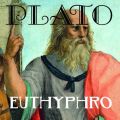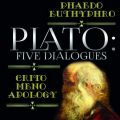
|
Euthyphro, by Plato, is a Socratic dialogue whose events occur in the weeks before the trial of Socrates (399 BC), for which Socrates and Euthyphro attempt to establish a definitive meaning for the word piety (virtue). Получить ссылку |
 Euthyphro
Euthyphro
Автор: Платон
Год издания:
 Teosed I. Sokratese apoloogia. Phaidon. Kriton. Pidusook. Charmides. Phaidros. Euthyphron
Teosed I. Sokratese apoloogia. Phaidon. Kriton. Pidusook. Charmides. Phaidros. Euthyphron
Автор: Platon
Год издания:
Vana-Kreeka filosoofi Platoni (427 347 e.Kr.) dialoogid on Ohtumaa filosoofia pohi. Tema mahukas kirjalikus parandis sonastatud kusimused on jaanud „filosoofia“ pohikusimusteks tanaseni. Platonil saab filosoofia esmakordselt selgepiirilise sisu kindla uurimisvaldkonnana, mis nouab kindlat motlemismeetodit. Dialoogide ammendamatu mitmekihilisuse ja mitmetimoistetavuse tottu on Platon endiselt, ka 2350 aastat parast surma, uuritavamaid „teemasid“ filosoofia ajaloos. Platoni „Teoste“ I koitesse on koondatud koik seni eesti keeles ilmunud Platoni tervikteosed ja uusi tolkeid („Phaidon“, „Phaidros“). Raamat annab pildi Platoni eesti keelde tolkimise ajaloost ja hetkeseisust. „Sokratese apoloogia“ on Platoni kirjanduslik versioon Sokratese kaitsekonest ateenlaste kohtu ees 399. a. e.Kr. „Kriton“ kajastab Sokratese surma-eelset vestlust sober Kritoniga, kes puuab teda veenda vanglast pogenema. „Pidusoogi“ vestlusteema on armastus dialoogil on olnud tohutu moju ohtumaisele „erose“ moistele. „Charmidese“ keskmes on vooruse olemus. „Euthyphroni“ keskmes jumalakartlikkus ja -vallatus. Esmakordselt eesti keeles ilmuv „Phaidon“, kreeka proosa meistriteoseid, kirjeldab samuti Sokratese viimast paeva enne surma ning on pohiallikaid Platoni hinge- ja ideedeopetuse tundmaoppimisel. „Phaidroses“ avaneb metafuusika algne situatsioon (T. Luik).
 Euthyphro
Euthyphro
Автор: Plato
Год издания:
 Euthyphro
Euthyphro
Автор: Платон
Год издания:
Euthyphro (Ancient Greek: ????????, romanized: Euthyphron; c. 399–395 BC), by Plato, is a Socratic dialogue whose events occur in the weeks before the trial of Socrates (399 BC), between Socrates and Euthyphro. The dialogue covers subjects such as the meaning of piety and justice. The Euthyphro dialogue occurs near the court of the archon basileus (king magistrate), where Socrates and Euthyphro encounter each other; each man is present at the court for the preliminary hearings to possible trials. Euthyphro has come to present charges of murder against his own father who, after arresting one of his workers for killing a slave from the family estate on Naxos Island, tied him and threw him in a ditch where he died of exposure to the elements without proper care and attention while Euthyphro's father awaited to hear from the exegetes about how to proceed. Socrates is astonished by Euthyphro's confidence in being able to prosecute his own father for the serious charge of manslaughter, despite the fact that Athenian Law allows only relatives of the dead man to file suit for murder. Euthyphro dismisses the astonishment of Socrates, which confirms his overconfidence in his own critical judgment of matters religious and ethical. The dialogues of Plato – Early, Transitional and middle, Later middle, Phaedo, Later middle, Late, Of doubtful authenticity.
 Plato: Five Dialogues: Euthyphro, Apology, Crito, Meno, Phaedo
Plato: Five Dialogues: Euthyphro, Apology, Crito, Meno, Phaedo
Автор: Платон
Год издания:
Plato was a philosopher in Classical Greece and the founder of the Academy in Athens, the first institution of higher learning in the Western world. He is widely considered the most pivotal figure in the development of philosophy, especially the Western tradition. Unlike nearly all of Plato's philosophical contemporaries, Plato's entire body of work is believed to have survived intact for over 2,400 years. The works which are most often assigned to Plato's early years are all considered to be Socratic dialogues, written from 399 to 387. Plato's Middle dialogues were writtten from 387 to 361 and Plato's latter dialogues were written in the period between 361 and his death in 347. This anthology volume includes Five Dialogues of Plato; Euthyphro – Apology – Crito – Phaedo – Meno. Apology, Crito, and Phaedo are dialogues in which Plato details the Philosopher Socrates' last days. Meno is a Socratic dialogue that attempts to determine the definition of virtue in general, rather than particular virtues, such as justice or temperance. Plato's Euthyphro is set in the weeks leading up to Socrate's trial, it features Socrates and Euthyphro, a religious expert who attempts to define piety or holiness. Plato's works are often textbook required reading for courses in politics & social sciences, philosophy, humanities, and Greek & Roman studies. This anthology volume includes many of Plato's most popular and studied works. The dialogues of Plato – Early, Transitional and middle, Later middle, Phaedo, Later middle, Late, Of doubtful authenticity.
Чтобы скачать книгу, отключите блокировку рекламы. Спасибо!

 Teosed I. Sokratese apoloogia. Phaidon. Kriton. Pidusook. Charmides. Phaidros. Euthyphron
Teosed I. Sokratese apoloogia. Phaidon. Kriton. Pidusook. Charmides. Phaidros. Euthyphron



